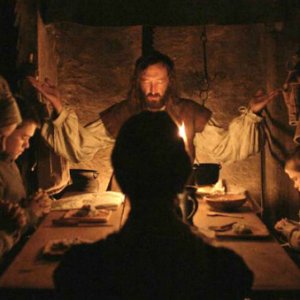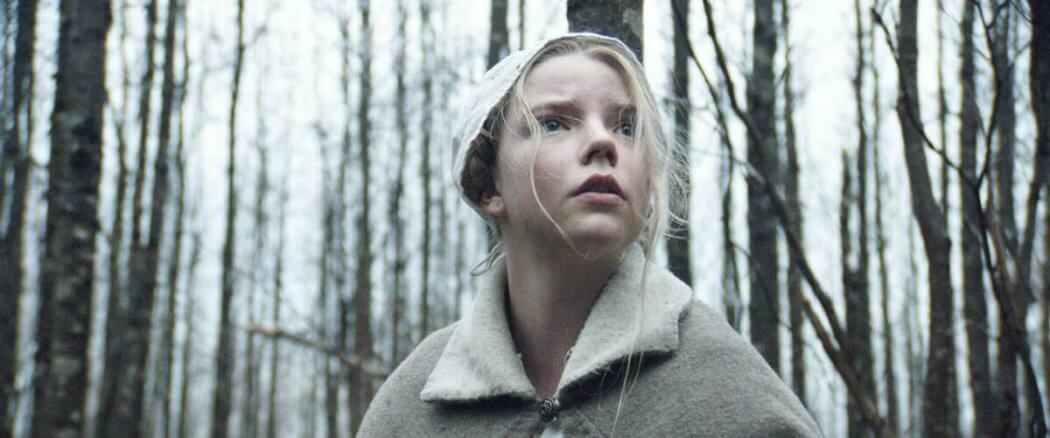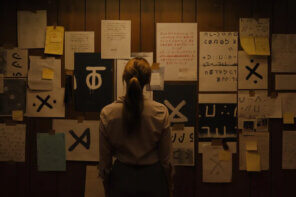About this time last year, buzz began to spread about a horror film hot off the festival circuit called It Follows. The reviews were incredible. Critics called it one of the scariest films in years. They were right. Not only was It Follows one of the best horror films in recent memory, it was also a great movie – earning a place on our top ten of 2015 for most of the year.
Now, in what appears to be an annual tradition, Spring has sprung another horror film with festival buzz: a little indie called The Witch. Comparisons to It Follows were immediate, mostly due to the timing of release, but also because of a loud group of horror fans who felt the scares in both films didn’t live up to the hype. Boo on them for hating on It Follows, but sadly they were right about The Witch. The film casts a hypnotic spell, but doesn’t have the staying power of classic horror. Still, The Witch remains a film worth seeing, not for the supernatural elements advertised, but for its chilling examination of Christian legalism.
The Simple Life
The Witch starts out with a secret fantasy of mine: leaving civilization behind and foraging into the great unknown. The civilization in question is a bustling settlement in 1630’s New England. The foraging stems from a theological dispute William (Ralph Ineson) has with the town’s leaders. We’re unclear who’s on the right side of the argument, but the conflict inspires William to lead his family away from their home into the heart of the wilderness to begin again.
 One could almost envy the family of seven at the start of the film. We taste the virtues of the simple life, far removed from the glowing screens and shopping centers of modern life. Instead of parents heading off to work and kids bussing off to school, everybody in this family spends the day together – doing chores, finding food, and gathering for meals around the table. This is a time when kids still minded their Ma and Pa, and everyone knew where their food came from.
One could almost envy the family of seven at the start of the film. We taste the virtues of the simple life, far removed from the glowing screens and shopping centers of modern life. Instead of parents heading off to work and kids bussing off to school, everybody in this family spends the day together – doing chores, finding food, and gathering for meals around the table. This is a time when kids still minded their Ma and Pa, and everyone knew where their food came from.
Unfortunately good times rarely last, especially in horror movies, and eventually all hell breaks loose. Literally. The family’s infant son goes missing, which begins a series of terrible events that brings evil to their doorstep. Something sinister lives in the foreboding woods at the edge of their house. Is it a Witch? We only see glimpses at first. Whatever the culprit, a dark fog infects this once peaceful home, and help is too far away.
A Solid Debut
Truth be told, The Witch is more eerie than scary. Director Robert Eggers revels in a tone of dread that gets under the skin and stays there. The music is effective – a brooding choir of anguish that reaches fever pitch at just the right moments. This film is a slow-boiler, drawing us in deeper and deeper until we feel as trapped as the characters.
But mood isn’t enough. Ultimately a great horror film needs to bring us to the brink, to that point where we’re not sure we can continue. I never got there with The Witch. The first problem is the language barrier. Eggers opts for an authentic Old English style to his dialogue. “What dost thou want?” a character asks. “What canst thou give?” the listener replies. We’re able to decipher the gist, but it takes some work, which in turn takes us out of the movie. Stuffy dialogue isn’t conducive to a genre dependent on primitive thrills.
Even more problematic, the movie feels too slight. The small farm setting elicits claustrophobia, but also keeps the chills confined. There just aren’t enough big moments here. Scenes crescendo with minimal payoff, and the ending is more silly than climactic. But Eggers has talent, and this is only his first feature film. He gets the fundamentals of horror, and better execution will come with experience. Overall, this is a solid debut from a director who’s just getting started.
Law vs. Grace
The scariest thing about The Witch isn’t the menace in the forest; it’s the menace in the hearts of William and his family. In fact, one could almost view the Witch in all of her manifestations as a metaphorical representation of religion gone amuck.
William is a pious man. He deeply desires to please God, and teaches his family to do the same. But there are two ways to please God – pleasing God in response to his forgiveness or pleasing God to get forgiven. The former is grace; the latter is law. William has no understanding of the freedom the Gospel offers. He is in a constant state of penance, trying to measure up to a stern and merciless Father.
 When Williams’ daughter Thomasin (Anya Taylor-Joy) is accused of wrongdoing by her siblings, William and his wife are quick to condemn her. There must be a reason why God is punishing them, and Thomasin becomes the sinful scapegoat. The entire family is trapped on a never-ending treadmill of performance. Is God angry? Did I not try hard enough? Am I really saved?
When Williams’ daughter Thomasin (Anya Taylor-Joy) is accused of wrongdoing by her siblings, William and his wife are quick to condemn her. There must be a reason why God is punishing them, and Thomasin becomes the sinful scapegoat. The entire family is trapped on a never-ending treadmill of performance. Is God angry? Did I not try hard enough? Am I really saved?
Performance-based Christianity is a temptation for every believer. That’s why Martin Luther encouraged Christians to preach the Gospel to themselves every day. We forget so easily. When we sin, we hide like Adam and Eve waiting for the divine fire bolt to blow us away. But the Gospel says that by faith our sins are forgiven, done away with, remembered no more. We can now walk tall, free of all condemnation.
That’s too good to be true for religious people like William. He wants to earn his salvation. So he tries to be good enough, falls short, despairs, pleads for mercy, and tries again, over and over in an endless hell. Meanwhile the joy disappears from his home, his family tears each other apart, and evil lurks in the shadows threatening to swallow them whole.
A Spring Tradition
I like this Spring tradition of thought-provoking horror. I hope it continues. Sadly, The Witch doesn’t live up to It Follows in impact, but that’s a tough act to follow. I sympathize with the disappointed. The hype machine is an aggressive force these days. Trailers provide unrealistic expectations, especially for horror movies, which is why it’s so refreshing when movies like It Follows rise to the challenge.
Still, The Witch and It Follows do share an important trait – they both rise above their genre trappings to provide artful commentary on the human condition; this, combined with an acute grasp of tone and engaging performances across the board, make The Witch a compelling introduction for Eggers.
There’s just one question: What will next year bring?





